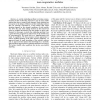Free Online Productivity Tools
i2Speak
i2Symbol
i2OCR
iTex2Img
iWeb2Print
iWeb2Shot
i2Type
iPdf2Split
iPdf2Merge
i2Bopomofo
i2Arabic
i2Style
i2Image
i2PDF
iLatex2Rtf
Sci2ools
CDC
2009
IEEE
2009
IEEE
Opportunistic scheduling in cellular systems in the presence of non-cooperative mobiles
Abstract— A central scheduling problem in wireless communications is that of allocating resources to one of many mobile stations that have a common radio channel. Much attention has been given to the design of efficient and fair scheduling schemes that are centrally controlled by a base station (BS) whose decisions depend on the channel conditions of each mobile. The BS is the only entity taking decisions in this framework based on truthful information from the mobiles on their radio channel. In this paper, we study the scheduling problem from a game-theoretic perspective in which some of the mobiles may be noncooperative. We model this as a signaling game and study its equilibria. We then propose various approaches to enforce truthful signaling of the radio channel conditions: an approach based on some knowledge of the mobiles’ policies, and an approach that replaces this knowledge by a stochastic approximations approach that combines estimation and control. We further identify o...
| Added | 21 Jul 2010 |
| Updated | 21 Jul 2010 |
| Type | Conference |
| Year | 2009 |
| Where | CDC |
| Authors | Kavitha Veeraruna, Eitan Altman, Rachid El Azouzi, Rajesh Sundaresan |
Comments (0)

